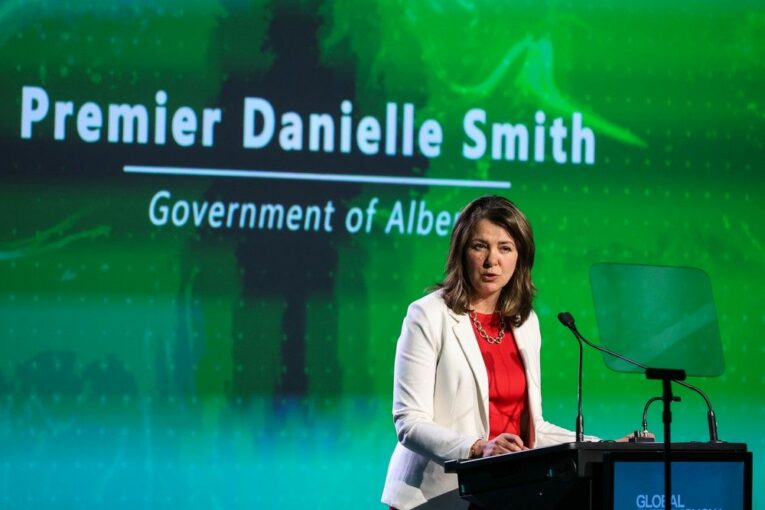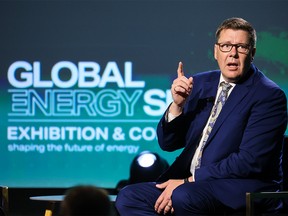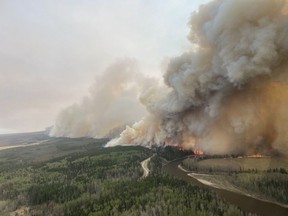
Danielle Smith is talking about co-operation — not confrontation — on two looming energy flashpoints as Alberta’s premier prepares to sit down with two federal cabinet ministers next week in Calgary.
However, she’s also touched base with her allies, including Saskatchewan Premier Scott Moe, and Smith indicated Tuesday she’s prepared for a conflict — if necessary — over Ottawa’s plans to impose an emissions cap on Canada’s oil and gas sector, and over federal regulations for a net-zero power grid by 2035.
That was Smith’s message to reporters after speaking at the opening day of the annual Global Energy Show in Calgary. The premier noted she had a chance to sit down with her Saskatchewan counterpart on Monday “and chat about our joint strategies.”
“I prefer collaboration as the first option,” she said of her government’s relationship with Ottawa.
“I think I have drawn the line in the sand … I’ve already raised it with my provincial counterparts that if we need to develop a coalition so that we can fight back against Ottawa, if need be, then that’s what we’re going to do.”
Saskatchewan’s premier, who also spoke at Tuesday’s energy conference, told the crowd it’s impossible for his province to move its electricity system to net-zero by 2035, a point Alberta has also made.
About two-thirds of Saskatchewan’s electrical generation is powered by natural gas and, to a lesser extent, coal.
“Quite simply, it isn’t attainable in Saskatchewan and, quite frankly, isn’t attainable in many other jurisdictions either,” Moe said after his speech at the BMO Centre.
“They (Ottawa) come forward with unconsulted, ideological and unrealistic policies, time and time again and now these policies are layering on top of one another.”

Federal Natural Resources Minister Jonathan Wilkinson and Intergovernmental Affairs Minister Dominic LeBlanc are expected to fly out to Alberta next week to meet with Smith.
The premier said she’s hopeful the two levels of government can find common ground on the issues, noting Alberta has made an aspirational commitment to reach net-zero emissions by 2050.
However, Alberta has staunchly opposed Ottawa’s plan to introduce an emission cap on the oil and gas sector, contending it would become a cap on production, intruding on provincial jurisdiction over natural resource development.
During last month’s provincial election campaign, Smith frequently blasted the Trudeau government over the high costs of moving the province’s electricity system to net-zero within a dozen years, saying it wasn’t feasible without imposing punishing costs on Albertans.
Instead, she’s called for the feds to extend the timeline to 2050, providing more time for greater technological developments to make the transition.
Last year, the Alberta Electric System Operator (AESO) estimated the potential expenses to reach the federal goal by 2035 would range between $44 billion to $52 billion.
According to AESO, purely gas-fired generation provided about 60 per cent of the province’s installed electricity generation capacity last year.
Federal officials have previously noted the rules on the net-zero grid are still under development and have yet to be released.
It’s still unclear how the two western provinces would seek to block any attempts by Ottawa to move forward on these contentious energy matters.
Recommended from Editorial
-

Smith, executives bring energy transition to centre stage at Global Energy Show
-

Alberta wildfires increase again, threatening air quality and energy production
-

Saskatchewan, Guilbeault clash over affordability of federal clean electricity standards
-

Varcoe: Alberta finally gets on net-zero train, but ‘aspirational’ plan needs detail
-

Alberta aims for net-zero emissions by 2050 in ‘aspirational’ climate plan
Moe said it would be up to the Trudeau government to attempt to litigate and stop the provinces from operating their own electricity grids how they best see fit, as the sector falls squarely under provincial jurisdiction.
Some political scientists have wondered if Smith would turn to her much-touted sovereignty act on the issue.
Alberta’s premier said the province should know within a couple of weeks whether her government can find a “common cause” with the federal Liberal government.
“Logic at some point has got to prevail here.”
Alberta is already seeing rapid development of its renewable energy sector, with billions of dollars flowing into new wind and solar projects. Last year, about 1.8 gigawatts of new solar and wind generation capacity was developed across Canada, with more than three-quarters built in Alberta.
Some business leaders are encouraging the two provinces to move faster, not slower, on greening their power grids, pointing out the ongoing development of battery storage technology and the potential of carbon capture projects.
The CEO of Greengate Power, which develops renewable projects in Alberta, noted there are more signs the climate is changing, pointing to wildfires that are now burning, spreading smoke across North America.
“We have a tug of war going on right now between the feds and the provinces about a net-zero target of 2035 for our electricity grid,” Dan Balaban told one panel at the Global Energy Show.
“I ask, can we afford to wait?”

Gurpreet Lail, CEO of Enserva, which represents the country’s energy services, supply and manufacturing sector, said her members are concerned about shifting to a net-zero grid within 12 years and what it will do to the affordability of electricity in Alberta.
“Where is all of the money going to come from for an investment into a grid like this?” she said.
“We are experiencing inflation. We are experiencing high costs. And now we’re saying we’re going to develop a (net-zero) grid by 2035 … It’s too much, too fast.”
Before that target is set in stone, Alberta and the federal ministers will sit down and look for compromise in the coming weeks on these issues.
We’ll know soon enough if any détente is short-lived or here to stay.
Chris Varcoe is a Calgary Herald columnist.
You can read more of the news on source
